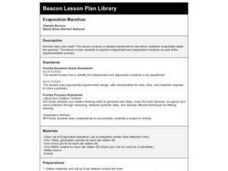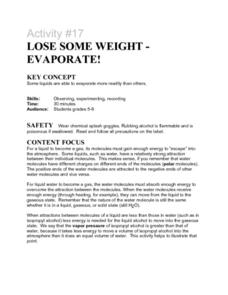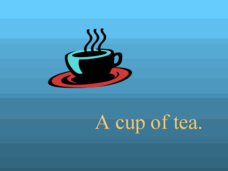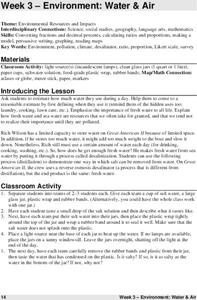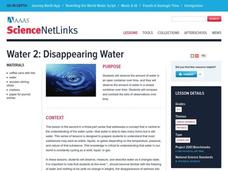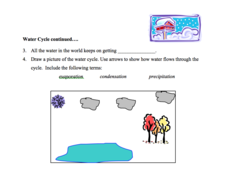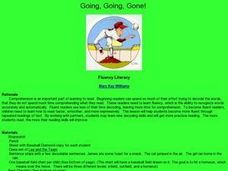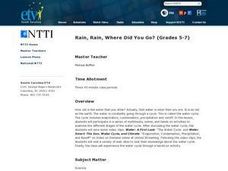Curated OER
Ashes to Ashes: Using Evaporation Rate to Identify an Unknown Liquid
Learners explore the concept of evaporation rates in this evaporation rates lesson. They will try to identify the chemical that began a fire, perform an experiment where they use the evaporation rates to determine the unknown liquid, and...
Curated OER
Evaporation Marathon
Pupils review the steps of the scientific method and participate in a three day experiment. They observe water evaporation over time.
Curated OER
Evaporation in the Water Cycle
Students study the stages of the water cycle and evaporation. In this water cycle lesson plan, students read Water Cycles and color a diagram of the water cycle. Students review related terms and sing a song about the Water Cycle....
Curated OER
Lose Some Weight- Evaporate!
Students determine that some liquids are able to evaporate more readily than others. They create a balance using cups and a ruler to determine which end of a strip dipped in alcohol or water evaporates the fastest, hence loses the most...
Curated OER
Cool Liquids
Chemistry neophytes use a temperature probe to assess the change as five different liquids evaporate. The implantation section suggests that they take readings every five seconds for a total of four minutes. They graph the data, look up...
Curated OER
Sugar in Tea
Little chemists address whether or not you can get sugar back out of tea after it has dissolved. The PowerPoint itself simply walks them through the questioning process, considering different possibilities. The final slide settles on...
Curated OER
The Water Cycle - Main Components
Present the water cycle to your middle schoolers with this lesson. After an anticipatory set, they participate in a Q & A session about the terms associated with the water cycle: evaporation, transpiration, condensation, and...
Curated OER
Physical Changes and States of Matter
Fourth graders identify a physical change as one that results in a change in size, shape, or state of matter. After an initial teacher-led discussion and demonstration, groups of students get together to perform an experiment which...
American Chemical Society
Why Do Puddles Dry Up?
Bring evaporation right into the hands of young scientists with an entertaining, hands-on activity. Investigators view videos and images while participating in class dialogue focused on water evaporating from surfaces. A short experiment...
CK-12 Foundation
Mineral Formation: Evaporating Lake
Get crazy for crystals! Junior geologists learn the secrets of crystal formation through lecture, reading, and examples. Other topics include common ionic compounds found in fresh and salt water, the effects of location on forming...
American Chemical Society
The Water Cycle
Bring the water cycle into the classroom without the mess. Learners build a model of the water cycle using everyday materials. They observe the process of evaporation and condensation and relate their observations to the larger scale...
Curated OER
Environment: Water & Air
The introduction to the lesson mentions a sailor's limited capacity to store drinking water on his ship. Pupils then set up an overnight experiment to remove freshwater from salt water by distillation. There is a math and map activity to...
Virginia Department of Education
A Crystal Lab
Young chemists grow ionic crystals, metallic crystals, and supersaturated crystals in three different lab experiments. Observing these under a microscope allows pupils to compare the various structures.
Curated OER
Evaporation Experiment- Desert Science Graph
In this science worksheet, students make a bar graph about desert evaporation. The directions say to use the "data from your recording data page" to display information on the graph.
Curated OER
Disappearing Water
Students explore the water cycle. In this earth science lesson, students observe and measure water in a closed container and in an open container. Students record their observations and compare their sets of data to draw conclusions...
Curated OER
Water, Water Everywhere!
Learners brainstorm on ways they use water, and where water comes from. They view video, Down the Drain, to gain specific facts about water use, properties of water, problems of water and the water cycle. They perform a lab activity...
Curated OER
Activity Plan 5-6: Where Does the Water Go?
Students perform an experiment to discover what happens to water as it evaporates. In this early childhood lesson plan, students observe evaporation as they conduct an experiment. Students fill cups with water, then check it daily for...
Curated OER
Going, Going, Gone!
Sixth graders use the scientific method to test variables of evaporation. In this evaporation lesson plan, 6th graders test a wet handprint on a paper towel and relate this experiment to weather conditions.
Curated OER
Rain, Rain, Where Did You Go?
Young scholars study the water cycle including condensation, evaporation, and precipitation. In this water cycle lesson, students watch a video and access assigned web sites to investigate the water cycle. They complete an experiment...
Curated OER
Sweat Your Socks Off
Fourth graders explore evaporation by conducting an experiment. In this water properties lesson, 4th graders examine the differences between two socks that get wet, one which is placed in front of a fan. Students discuss why the sock...
Curated OER
The Water Cycle
Third graders investigate water formations by conducting an experiment. In this water properties lesson, 3rd graders utilize pie tins, sponges and salt shakers to create an evaporation and saturation experiment. Students collaborate in...
Curated OER
Dimming The Sun
Students review the meanings of global warming and global dimming. While watching a video, they take notes on different aspects of the issue. In groups, they develop a list on what can be done to reduce global dimming. They...
Curated OER
Rain On
Fourth graders explore evaporation and condensation. In this water cycle lesson, 4th graders investigate their surroundings for real-life examples of evaporation and condensation. Students conduct various experiments.
Curated OER
Condensation
Students participate in the scientific process to investigate what happens to water when it evaporates by observing condensation. In small groups they observe what happens to ice in a cup, and what occurs when they hold a bowl of ice...



